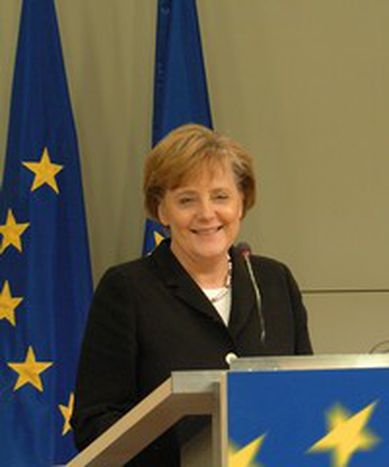
A tale of two presidencies: no firm promises
Published on
Translation by:
Nabeelah ShabbirThe constitution, energy security, detangling bureaucracy: Germany dampened expectations as they took over the EU presidency on January 1
‘Europe – succeeding together!’ is the gung-ho motto chosen by the new EU presidents this year. But can slogans be hauled into schedules? Six months is not a long enough period to introduce great changes. Berlin is rightly collaborating closely with upcoming presidency-holders Portugal and Slovenia. It's a tactic which ensures the continuation of a presidency much needed in European politics.
March 25 signals a particularly special date for the presidency. This is when the 50th anniversary of the signing of the Treaties of Rome will be celebrated, marking the birth of the European Union. Alongside the event, Germany will also be issuing the ‘Berlin Declaration’ of EU heads of state and government, paying tribute to the values of the European project. Frank-Walter Steinmeier, German Minister of Foreign Affairs, has previously played down expectations placed on the presidency: ‘We cannot perform miracles in six months.’ Steinmeier is aware just how daunting the Federal Government agenda looks this year, as Germany assumes the G8 presidency at the end of the EU one.
Three top objectives stand out in both German presidencies:
Breathing life into all things constitution
In mid-December, German chancellor Angela Merkel declared that the European Constitution came third on the list of priorities. All for one looming reason: advisers have tied German presidential hands before the new French president is elected in April 2007. It’s a theme that will no doubt stick for the entire six month presidency-span, now that more voices are clamouring for the revival of the constitution. Spain and Luxembourg share ‘go-slow views’ on expansion. Germany will thus wait to present its proposals together with other deliberations for the summit of Heads of States and Government, in mid-June. Despite the fact that Angela Merkel wants to precipitate a project of this type, her elaboration could cause difficulties. She is unable to present the same text again to the French and the Dutch, at whose hands the referenda died in mid-2005. In reality, she should above all consider the possibility of offering a shorter version of the text, focussing more on fundamental rights and the urgency of institutional reform. The third part of the constitution which was quite controversial in France should be cut out.
Reckoning with climate change
The ongoing battle to fight climate change is also a key theme of both German tenures. The European Comission was on the verge of fining Germany, the EU’s biggest polluters, when they did not respect Kyoto commitments and meet targets. They are now obliging the rest of the member states to adopt stricter methods against climate change in the next six months. Within this framework, their position is aligned with the EU in fighting climate change as of 2012, after the Kyoto protocol expires.
Germany also seeks a reduction of 30% by 2020. As the biggest producer of greenhouse gases within the EU, they tried to slash their emissions to 40%. Moreover, the states discussed the intervention of EU environment chief Stavros Dimas at the final European Council meeting of 2006. The Commission will present their decision at the end of December, in which they will also propose including airline operators in the emissions trading scheme from 2012.
Dismantling bureacracy
Merkel's call for a reduction of EU bureacracy reflects how Berliners in particular question an overregulated European Union. Merkel has said that an increase in directives does not lead to further economic prosperity for the European Union. It's a paradoxical stance to take, as Germany itself has quite an own infamous bureaucratic record. From the point of view of the chancellor, the most important factor is to apply discontinuity to the European parliament. A simple process lies behind all the red tape and mounds of paper, and has been used for a long time in national parliament. After a piece of legislation comes to an end, all the directives which have not yet been adopted simply lose their validity – a method thereby ensuring a more efficient parliamentary output.
Translated from Deutscher Ratsvorsitz: Die Erwartungen sind hoch



